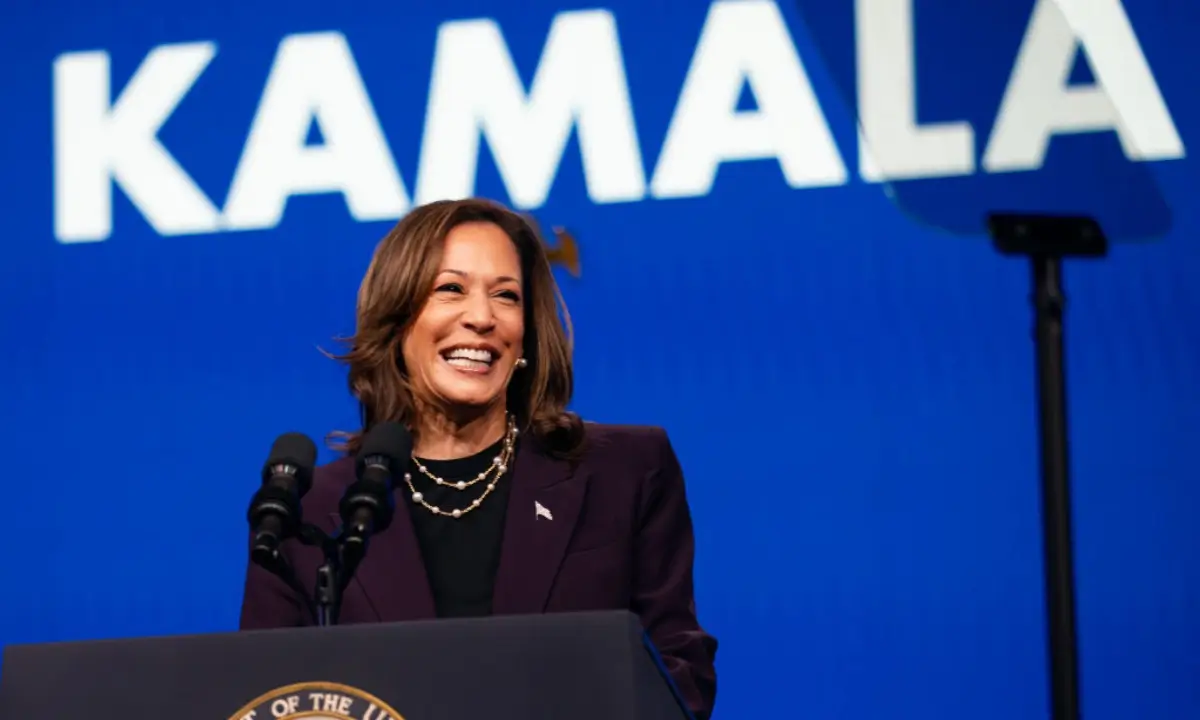‘They Need to Go Through… Therapy’: Kamala Harris Savagely Claps Back at Critics Who Dare to Question Her Blackness In Candid Interview Ahead of Tim Walz Debate
Vice President Kamala Harris received praise and shade for her appearance on the ‘All The Smoke’ podcast hosted by former NBA stars Matt Barnes and Stephen Jackson, which aired on Monday.
Some people critiqued her “fake urban accent” and said Harris was pandering to Black voters, while others found fault with her policy positions, from the economy to marijuana legalization. Many clapped back to defend Harris as being more in touch with working and middle-class Americans and more trustworthy than former President Trump.
The wide-ranging interview was taped at her home in Washington, D.C, last week. It included breezy talk about her support for the Golden State Warriors. There was also a somber dive into policing reform and the mental health trauma of Black men exposed to violence. She passionately emphasized the importance of HBCUs. Additionally, she sampled her campaign material on the economy, stressing the need to get more capital into the hands of small business owners and Black people lacking intergenerational wealth.
Barnes, acknowledging his own mixed-race background, plunged in early with a question about her Black identity, one that some viewers felt she had previously side-stepped in an interview with CNN’s Dana Bash, asking what Harris thinks when others call her race into question.
“Well, one, I don’t listen to it,” Harris replied. “I’m really clear about who I am. And if anybody else is not, they need to go through their level of therapy. … My mother was very clear. She was raising two Black girls to be two proud Black women.”
Some people who heard or saw the podcast still found this answer cagey, and accused Harris of only recently embracing her Blackness. Others insisted she had slipped into a fake Black accent — “I love when she uses that urban accent out of nowhere. She’s an actress, not a politician,” said one post on X — while some recognized the way Harris spoke to her Black sports star co-hosts as code-switching.
“No one even knows how she speaks except her family and her closest friends,” said Olivia Marie on YouTube. “Every politician has their professional voice, that is what you are used to. Also, you’re reading into this entirely too much. I can’t believe you are focused on how a potential president sounds instead of their policies.”
A prevalent critique of the interview on social media was that it consisted of “softball questions” and hazy answers by Harris, especially on policy. However, many people liked the relaxed, conversational interview format and thought it gave Harris room for personal reflection and nuanced responses, which they hadn’t seen in her debate with Trump or in conventional media interviews.
The interview topic that got the biggest rise out of Black audiences might have been marijuana legalization. When sked about her policy on cannabis, Harris said:
I just feel strongly people should not be going to jail for smoking weed. And we know historically what that has meant and who has gone to jail. … We need to legalize it and stop criminalizing this behavior. … And this is not a new position for me. I have felt for a long time that we need to legalize it.
One commenter on YouTube noted the “irony” of “’ All The Smoke’ interviewing the woman who actually put brothers in jail for smoking the weed.”
Many people posted that as a district attorney in San Francisco and as attorney general in California, Harris sent thousands of Black people to jail for smoking marijuana and called her evolving position on decriminalizing marijuana a “flip-flop.”
The Texas Cannabis Collective posted on Facebook that Harris “holds the record in California for jailing the most people over weed when she was a prosecutor.”
The Hill noted that as a prosecutor, Harris spoke out against Proposition 19, the failed 2010 California ballot measure to legalize and regulate marijuana, but that later, as a U.S. senator, she co-sponsored with Sen. Cory Booker (D-New Jersey) in 2019, a bill to end the federal prohibition of marijuana.
But others noted that her stances on lessening criminal penalties for smoking or using marijuana and legalizing recreational use of the drug are not so new — and argued that she hasn’t actually locked up that many marijuana users.
Most of the 1,900 marijuana cases prosecuted under Harris as the DA in San Francisco between 2004 and 2010 were downgraded to misdemeanor charges, and very few of those convicted were actually sent to prison, according to a report by American Progress Action earlier this month. Harris pushed for alternative measures such as drug treatment programs for low-level offenders, and launched a reentry program with a low recidivism rate.
As a state prosecutor, she focused on prosecuting transnational and interstate drug traffickers and was not responsible for prosecuting low-level marijuana offenders.
While running for president in 2019, she called for expunging nonviolent marijuana-related criminal offenses, a move the Biden administration has now implemented, along with an effort to reclassify marijuana as a less restrictive drug, The Hill noted. But in calling for full legalization of marijuana, Harris has now gone beyond Biden in her policy rhetoric on cannabis.
Harris’ vice president pick, Minnesota Gov. Tim Walz, and Trump’s running mate, Sen. JD Vance of Ohio, will face off Tuesday in the only scheduled vice presidential debate before the November election.
The debate, moderated by CBS’s Norah O’Donnell and Margaret Brennan, will start at 9 p.m. ET at the CBS Broadcast Center in New York City and run for 90 minutes.
The debate format includes no audience, no opening statements, and strict rules on candidate interaction, with Vance opting to deliver his closing statement second after winning a coin toss.

